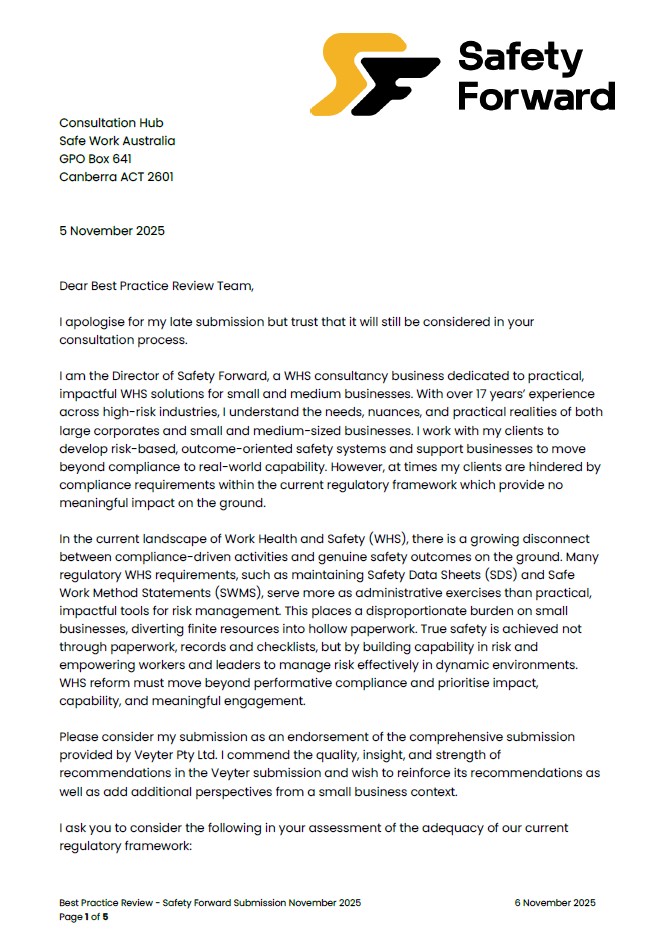Why I Spoke Up: A Small Business Perspective on WHS Reform
In this post, I share the key messages from my recent submission to Safe Work Australia’s Best Practice Review of the Model WHS Laws. Drawing on my experience as a small business WHS consultant, I highlight why our current system needs reform, the real-world challenges faced by small businesses, and what practical changes are needed to make safety meaningful—not just a paperwork exercise.
As the Director of Safety Forward, I spend my days working alongside small and medium businesses, helping them navigate the maze of Work Health and Safety (WHS) compliance. I see firsthand the challenges, frustrations, and too often the wasted effort that comes from a system more focused on paperwork than on real-world safety outcomes.
Recently, I submitted my perspective to Safe Work Australia’s Best Practice Review of the Model WHS Laws. It wasn’t easy to find the time. Like many small business owners and consultants, my days are full, and the administrative burden of running a business is already heavy. But I felt compelled to speak up, not just for myself, but for the many clients I support who feel the same way. I want to call out Andi and the team @ Veyter because their submission inspired me to also take action.
What’s Broken?
Our current WHS framework is built on good intentions, but in practice, it often misses the mark. Too many requirements, like maintaining Safety Data Sheets (SDS) and Safe Work Method Statements (SWMS) have become box-ticking exercises. They demand hours of admin, but rarely translate to safer workplaces, especially for small businesses with limited resources. I see first hand the culture and mindset this has created, where organisations are more focussed on making sure bandaids are in date than preventing critical incidents.
Even more concerning is the way accountability is diluted in complex contracting chains. Large entities, sometimes international conglomerates or venture capital firms, impose WHS expectations and metrics from afar. These are often impractical, irrelevant, or even hazardous for those actually doing the work. The people at the bottom of the chain—small businesses and subcontractors—are left to manage the consequences, with little power to push back, even when safety is at risk.
Consultation: A One-Way Street
The law assumes everyone has an equal voice, but the reality is very different. Small businesses rarely have the opportunity to “consult up the chain.” The complexity of modern business relationships means that meaningful consultation is often impossible for those at the bottom. We need mechanisms that genuinely empower small business voices and ensure engagement and accountability across all tiers of the complex business relationships. The small guy at the bottom holds disproportionate risk right now.
Inspectors and Real-World Competence
Another gap is the inconsistency in inspector training and experience. Too often, inspectors are recruited from enforcement backgrounds, with little practical WHS experience. This leads to a focus on black-and-white compliance, rather than practical risk management. We need to acknowledge this and have a nationally consistent, competency-based approach to inspector training, one that values real-world application over checklists.
Moving Beyond Paperwork
True safety isn’t achieved by filling out forms or writing documents. It’s about building capability, ensuring workers and leaders have the knowledge, judgment, and adaptability to manage risk in real time. We need to shift the focus from “training” to genuine competence and ongoing learning.
What I’m Asking For
In my submission, I endorsed the recommendations of Veyter Pty Ltd and added my own, calling for:
Accountability for all parties in complex business relationships, mirroring the Chain of Responsibility model in heavy vehicle law.
Consultation reforms that empower small business voices in complex business chains.
A nationally consistent, practical inspector training framework.
A review of compliance requirements to remove or streamline those that are purely performative.
A renewed focus on capability and risk resilience, not just paperwork.
Why It Matters
I love small businesses - I am one, and small businesses make up the backbone of our economy and the majority of our high-risk industries. If WHS reform doesn’t work for us, it doesn’t work at all. My hope is that by sharing my perspective, and the experiences of my clients, we can move towards a system that truly protects people, supports business, and delivers real safety outcomes.
If you’re a small business owner or WHS professional who feels the same, connect and let me know.


